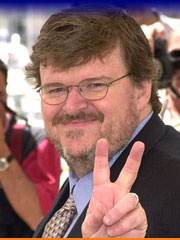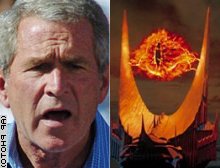Humor for Hawks
Here's a pretty old legacy post from the blog archives of Geekery Today; it was written about 21 years ago, in 2004, on the World Wide Web.
(The link is courtesy of Aeon Skoble on Liberty and Power, who got it from Fark.)

Among the wits who brought you such straight-to-DVD cinematic masterpieces as FahrenHYPE 9/11
(which is advertised as a rationalization for your preconceived conclusions about Michael Moore) and Celsius 41.11
, this, apparently, is the sort of thing that passes for sophisticated satire:
Fellowship 9/11
. . .
Michael Moore’s searing examination of the Aragorn administration’s actions in the wake of the tragic events at Helms Deep. With his characteristic humor and dogged commitment to uncovering — or if necessary fabricating — the facts, Moore considers the reign of the son of Arathorn and where it has led us. He looks at how — and why — Aragorn and his inner circle avoided pursuing the Saruman connection to Helms Deep, despite the fact that 9 out of every 10 Orcs that attacked the castle were actually Uruk-hai who were spawned in and financed by Isengard.
… and the film goes on like that.

Fighting the War on Evil
Now, I don’t have any problem with a good send-up of Michael Moore; but as satire, this is as artless as a MAD Magazine comic, and ends up making warhawks look an awful lot sillier than Michael Moore.
If George Bush were personally going into battle to lead the fight against a massive assault already launched against all the strongholds of the civilized world, by monstrous armies of vile, inhuman goblins, directed by undead great lords of men, and bent to the unholy will of a supernatural Dark Lord who desires nothing less than the complete desolation and domination of the whole Earth, then I don’t doubt that Michael Moore would not have had quite the same objections to Mr. Bush or to his policies.

Misunderstandings of Tolkien’s work abound.
Do warhawks actually think of the war against Iraq like this? As much you might be inclined to say, Come off it, it’s just a stupid joke
, the fact is that much of their rhetoric outside of this silly little film seems to indicate that they honest-to-God do. And if they do, it would be very funny–except for all the people who have died because of such childish conceptions of the world.
J.R.R. Tolkien, for his part, put it this way:
The real war does not resemble the legendary war in its process or its conclusion. If it had inspired or directed the development of the legend, then certainly the Ring would have been seized and used against Sauron; he would not have been annihilated but enslaved, and Barad-d?@c3;bb;r would not have been destroyed but occupied. Saruman, failing to get possession of the Ring, would in the confusion and treacheries of the time have found in Mordor the missing links in his own researches into Ring-lore, and before long he would have made a Great Ring of his own with which to challenge the self-styled Ruler of Middle-earth. In that conflict, both sides would have held hobbits in hatred and contempt: they would not long have survived even as slaves.
. . .
An author cannot of course remain wholly unaffected by his experience, but the ways in which a story-germ uses the soil of experience are extremely complex, and attempts to define the process are at best guesses from evidence that is inadequate and ambiguous. It is also false, though naturally attractive, when the lives of an author and critic have overlapped, to suppose that the movements of thought or the events of times common to both were necessarily the most powerful influences. One has indeed personally to come under the shadow of war to feel fully its oppression; but as the years go by it seems now often forgotten that to be caught in youth by 1914 was no less hideous an experience than to be involved in 1939 and the following years. By 1918 all but one of my close friends were dead.
–Foreword to the Second Edition of The Lord of the Rings
And this way:
Life in camp seems not to have changed at all, and what makes it so exasperating is the fact that all its worse features are unnecessary, and due to human stupidity which (as
plannersrefuse to see) is always magnified indefinitely byorganization. . . . However it is, humans being what they are, quite inevitable, and the only cure (short of universal Conversion), is not to have wars — nor planning, nor organization, nor regimentation.–from a letter to Christopher Tolkien, 6 May 1944, Letters of J.R.R. Tolkien #66
This is a very interesting post, and after reading the quotes you posted from Tolkien I understand how easely his work is misrepresented by right-wingers.
Yet I am not sure that is the case of the movie….
Actually, Sergio, I think that warhawks who try to appropriate the films as some kind of War on Terror agitprop (or mutatis mutandis, those on the Left who dismiss them as such–cf. Salman Rushdie’s review, for example)–are mistaken about the films no less than they are about the books.
It doesn’t come out as clearly in the movies, because of the obvious role that spectacle plays in them, and the diminishment of certain key characters (in particular, Faramir). But if you pay attention in scenes such as Saruman’s speech in the Two Towers, the passage of the Dead Marshes, the introduction of Faramir in Ithilien, the doomed charge on Osgiliath, etc., a reflection of Tolkien’s own views on war and martial “glory” shine through pretty clearly.
Jackson also makes this somewhat clearer in his interviews and the commentary than it might be from just viewing the film on its own.
Anyway, the post is not mainly about Tolkien (or Jackson) exegesis, but rather about the way that warhawks try to warp the war against Iraq, of all things, into a cartoonish version of narratives like Tolkien’s. (And I don’t buy “it’s just a joke, man!” defenses–why would anyone think a joke about a Patriot Act that deprives Orcs of due process is funny unless he doesn’t care very much about the fact that the real Patriot Act is causing real people to be spied on, imprisoned, and tortured without cause? Etc.) But these are interesting questions to raise. Tolkien was a humane and peace-loving man, who detested and articulately condemned the schemes of “planners”, the pretensions of the powerful, and the sort of ruddy-faced militarism of which he is often accused. He’s far from being the property of the Right, and the Right-wing illiterates who casually appropriate him (or, mutatis mutandis, George Orwell, Thomas Jefferson, Jesus Christ, etc.) for their ideological point are treating his works no better than the Mongols who, after sacking the Great Library of Baghdad–so the story goes–tore apart the priceless volumes of ancient learning and used the leather binding to sole their shoes.
I read with some interest your comments about our movie. It was fascinating, mainly because you entirely missed the point of the film which was certainly not to be a justification for Bush’s war. You also jump to the conclusion that we, the filmmakers, are “warhawks” and that because we joke about the Patriot Act we must not care about people who are oppressed by it. Of course, it’s your right to believe that the movie sucks, even though you missed the point of it. But don’t pretend to know our thoughts or what is our hearts.
Write this down. Just because someone disagrees with you, it doesn’t mean they’re evil.
Sergio had it right. You didn’t get our movie.
Have a nice day.
Jack
Mr. Thomas – Please do elucidate this “point” Rad Geek missed. While I found your movie amusing enough, I myself also seem to be unable to perceive this same “point”, and would like clarification.
If I’ve been uncharitable to Jack Thomas and his collaborators, by lumping “Fellowship 9/11” together with some of the all too real attempts to fit Mr. Bush’s war on the world into a caricature of Tolkien’s work, then I apologize.
If that’s the case, then I should merely have described it as a leaden attempt at satire that some people other than the makers seem to find funny for entirely the wrong reasons.
One way or the other, though, it’s not to see the film as trying to make a joke at the expense of Michael Moore and his polemic against Mr. Bush and his wars in Fahrenheit 9/11. Fair enough: there are some things well worth sending Michael Moore up for. But one interesting thing about “Fellowship 9/11” is that it does so in a way that systematically makes warhawks look far worse than Michael Moore does–since gags such as the interview with Aragorn about going to fight in the war, or the discussion with troops about the inhumanity of Orcs, point out nothing so clearly as the real differences between the real conduct of the real war and between Tolkien’s mythical war.
As satire of Michael Moore, on the other hand, it’s not very effective–since he would hardly raise the objections he raises if, say, George Bush really were leading the fight in his own war against unholy powers of darkness.
Michael Moore has enough faults of his own; maybe I’m odd, but I would find it a lot funnier to satirize the faults he has rather than inventing new ones that are easier to ridicule.
As for the PATRIOT Act: I’d be glad to hear more about why you find it funny to compare the real Patriot Act–under which real people who are being harassed, spied on, imprisoned, and tortured without cause–to a satirical act under which a twisted race of monsters bent on the annihilation of humanity can be attacked on sight. Do you think that Michael Moore’s case against the real Patriot Act, which is ruining real people’s lives as we speak, is flawed? If so, how? Do you disagree with him about the nature of the Patriot Act, or just with his presentation in Fahrenheit 9/11? I note that you didn’t decide to make similar jabs at Moore’s footage of American soldiers maimed or dying in Iraq–with good reason, because doing so wouldn’t be funny.
I hardly think that all those who disagree with me are evil; and I certainly don’t think that of anyone who was involved in the making of the film. I am interested in hearing more about the points at which you think we do “disagree” (since you think that I have fundamentally misunderstood them), and what you take to be the point of the film that you think I missed.
I am not sure if Charles did not get the movie. I doubt it. What I am sure, is that Jack didn’t get my post. I was not commenting on the movie that tried to make a satire on Micheal Moore, but about the recent movies about Tolkien work The Lord of the Rings. What I meant is that while it is clear that tolkien works cannot be used to make an apology for war (and specially this one) as Charles post demostrated, I was not sure if the movies of Jackson had the same intention.
But I admit it was my fault since I used the term in singular ().
Discussed at www.radgeek.com /#
Geekery Today: